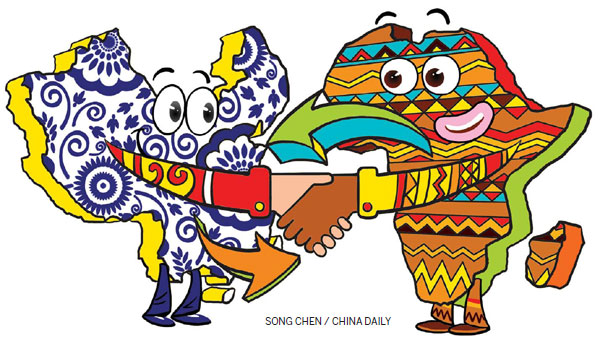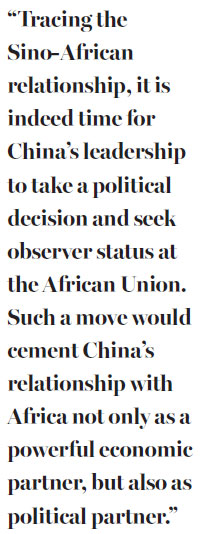China should seek AU observer status
Updated: 2016-04-22 07:10
By Philip Etyang(China Daily Europe)
|
|||||||||
Relationship is a shared history of political, economic and moral support from Beijing to the continent
China has in the recent past demonstrated an unprecedented interest in working with the African Union, especially in maintaining peace and stability in the continent. Some of the measures include providing financial support to AU peacekeeping missions in Africa and to the AU Standby Force, as well as training peace and AU security officers and peacekeepers.
At the latest Forum on China Africa Cooperation Summit, held in South Africa in December, China vowed support to the Agenda 2063 roadmap set out by the AU, especially the 10-year implementation plan for Africa.

China also pledged support to the AU and other sub-regional organizations such as the Common Market for Eastern and the Southern Africa, or Comesa, and Southern African Development Community, or SADC, through capacity building and human resources development.
During the fifth FOCAC meeting in Beijing in 2012, the African Union was made an observer of the entire FOCAC process, a move which has since paved the way for stronger collaboration between the two. Last year's FOCAC saw China call on the AU to set up a representative office in Beijing soon.

Evidence of stronger and renewed ties between China and the AU after the latter acquired observer status to the FOCAC process are very much visible through state visits, development projects and funding. In 2014, during Premier Li Keqiang's visit to African states, he made a speech at an AU meeting where he advanced the 4-6-1 China-Africa cooperation framework.
The 4-6-1 framework put forward by Li involves four principles: respect for sovereignty, respect for core interests, seeking pragmatic cooperation, and achieving mutual benefits. The second part of the framework involves six projects, including financial cooperation, industrial cooperation, cultural exchanges, security and poverty reduction. The last part of the framework involves conducting all exchanges under one platform, which is FOCAC.
A year later, China signed a landmark agreement with the AU to connect all African capital cities by road, rail and air. The agreement to boost trade between African countries was referred to as "building of the three networks agreement". The same year, China set up a permanent mission to the AU in Addis Ababa, Ethiopia, and appointed Kuang Weilin, a former ambassador to Sierra Leone, as the head of the mission. Previously China only had a representative to the AU.
Tracing the Sino-African relationship, it is indeed time for China's leadership to take a political decision and seek observer status at the African Union. Such a move would cement China's relationship with Africa not only as a powerful economic partner, but also as political partner.

Though the 54 African countries have varying economic and political institutional realities, they at times, do have common interests, especially on foreign policy and climate issues. As an observer at the AU, China will be in a position to freely lobby for one African voice by requesting to have issues of particular interest included in the AU agenda.
A case in point is the Kyoto Protocol. African countries regard it as an important treaty that needs to be respected, and China would be in a position to use the AU plenary to lobby for a united stand.
Observers also have access to AU documents that deal with issues of interest to both parties and a special invitation to closed sessions dealing with such issues.
An observer status will consummate this dyadic relationship, placing China in a position to assist and strengthen the African Union and African regional bodies in promoting stability and sustainable development. Contrary to conventional perception, since the early days of its founding, China had emotional affinity toward Africa, not just a political or economic relationship. China's sense of empathy and common ground with Africa was a result of their shared historical experiences, both being victims of colonization who faced the same fight for national independence and liberation after World War II.
In the 1960s and '70s, China provided large amounts of foreign aid to newly independent African despite its own domestic economic difficulties at the time - one famous example being the building of the Tanzania-Zambia Railway.
It was in 1972 that China learned of Africa's political importance and value in the international arena: 26 countries voted for the People's Republic of China to resume its seat at the United Nations. African votes represented more than one-third of the countries that supported the resolution.
China since then has relied heavily on diplomatic support and cooperation from African countries in the international arena and multilateral forums for its political agenda and policy support. Currently, the 54 African states account for more than one-fourth of the United Nations member states and votes.
The author is a PhD student at Kenyatta University in Nairobi and a contributor to China Daily. The views do not necessarily reflect those of China Daily.
Today's Top News
Inspectors to cover all of military
Britons embrace 'Super Thursday' elections
Campaign spreads Chinese cooking in the UK
Trump to aim all guns at Hillary Clinton
Labour set to take London after bitter campaign
Labour candidate favourite for London mayor
Fossil footprints bring dinosaurs to life
Buffett optimistic on China's economic transition
Hot Topics
Lunar probe , China growth forecasts, Emission rules get tougher, China seen through 'colored lens', International board,
Editor's Picks

|

|

|

|

|

|







